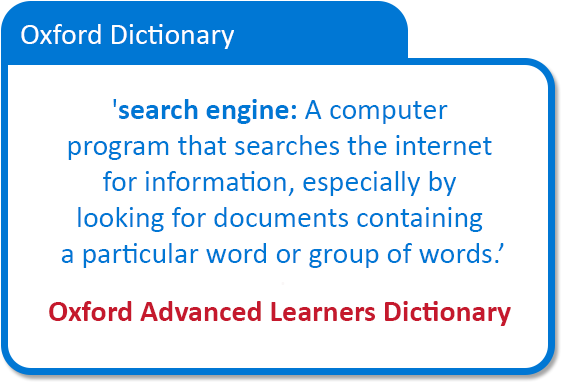Topic outline
- General
- Welcome and introduction


I'm sure that you have heard the phrase: 'just Google it'! In fact, the word 'Google' now appears in the Oxford Advanced Learner's Dictionary as a verb:

(Available online here)
During this study unit, we will introduce you to search engines. We will focus on 'efficient searches' since there is such a plethora of information out there, that a single 'inefficient' search can load millions of results! So what's the advantage of using a search engine? A quick thought that comes to mind is that it provides you with the opportunity to present your learners with the latest resource materials, no more outdated or old fashioned teaching materials any more! So without further ado, let's begin!

By the end of this unit, you should be able to:
- Search for, and find, curriculum resources aligned to your specific curriculum
- Utilise different search strategies.

- What is ...?

In unit 10 we covered the following:
- What is the internet?
- What is a browser?
- What is a URL?
Can you recall the differences between the above? If not, quickly review the second step (button 2) in unit 10 before we continue on what a search engine is and how to use it effectively.
The Oxford Learner's Dictionary defines a search engine (noun) as:

(Available online here)
So to summarise:
- A browser gives you access to the internet
- Once you have internet access, the search engine allows you to search the internet
It's important to understand this difference.
- Popular search engines

Now that we understand what a search engine is, let's explore popular search engines. Here are three examples which you have most likely heard of before:
Let's do a quick exercise! In each of the above search engines, search for 'Newton's second law of motion'. Which search engine did you prefer and why? Which search engine was the easiest to use? Which search engine was the fastest and displayed the best results? Put your thoughts in the forum group discussion below. Each person must post at least one comment and one reply.
- How to effectively search using Google

In this unit of study, we will focus on using Google as our search engine. However, you are able to apply the search principals to your preferred search engine e.g. Microsoft Bing or Yahoo (to name just two).
Review the presentation and video below. These resources will provide you with some tips on how to effectively search for resources using Google.

Complete the quick quiz below - this only has four questions but it will test your knowledge on a few advanced search techniques.
- Global Education Coalition (GEC)

The following enrichment resources were made available by our GEC partners.
- Reflection activity

Having reviewed the videos and presentation on how to search more effectively using Google, please complete the following short activity:- Think of a topic that you are currently covering with your learners in a specific subject area
- What resources (e.g. videos or articles) could make this lesson more interesting and insightful?
- Use a search engine of your choice to search for these resources
- Find three relevant resources. Either save these on your computer or copy the hyperlink where you found them
- Plan how you will incorporate these three resources into your lesson. Some pointers:
- Will you print out the article to hand out to the learners?
- Will you show them the video in class
- How will you ensure that your classroom has access to the internet?
- Write your thoughts down in the journal below.
- Conclusion, attribution and licence


Congratulations on completing this study unit! You should now have a clear understanding on the differences between the internet, a browser and a search engine. No matter which search engine you have selected to use, you should feel more comfortable with incorporating more advanced search techniques when looking for particular resource materials. This in turn will most definitely save you time in not having to sift through millions of search results. Practice these skills - they will be invaluable to you.

The following resources were consulted in this study unit. Fully copyright but free to use:
- GCF LearnFree. (2018). Search better. Available online here
- GCF LearnFree. (nd). Google Chrome. Available online here
- GCF LearnFree. (2018). Search better. Available online here

ICT Essentials for Teachers by UNESCO is licensed under a Creative Commons Attribution-ShareAlike 4.0 International License.
All content not licensed under a Creative Commons licence is all rights reserved, and you must request permission from the copyright owner to use this material.
1
2
3
4
5
6
7
